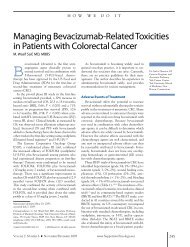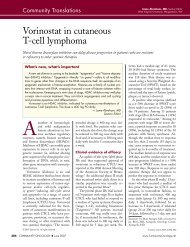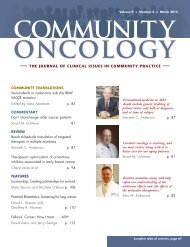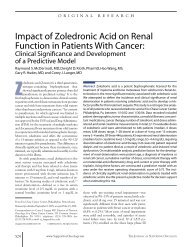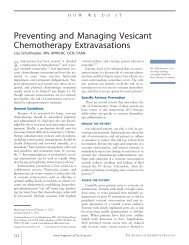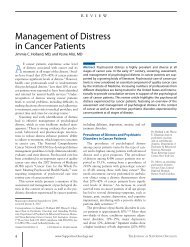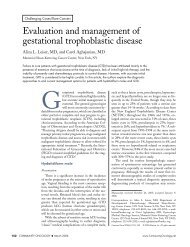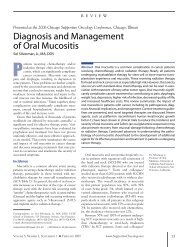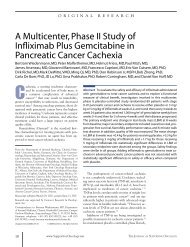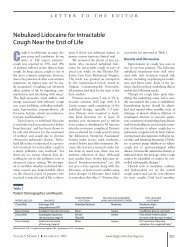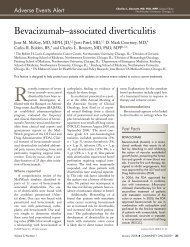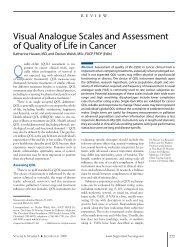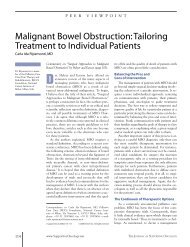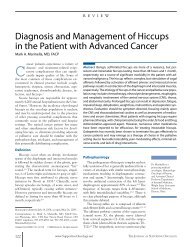Evaluating the “Good Death” Concept from Iranian Bereaved Family
Evaluating the “Good Death” Concept from Iranian Bereaved Family
Evaluating the “Good Death” Concept from Iranian Bereaved Family
You also want an ePaper? Increase the reach of your titles
YUMPU automatically turns print PDFs into web optimized ePapers that Google loves.
H O W W E D O I T<br />
Recognizing Depression in Patients with<br />
Cancer<br />
Alicia Morgans, MD, and Lidia Schapira, MD<br />
Caring for <strong>the</strong> “whole person” across <strong>the</strong> continuum<br />
of disease remains a top priority for<br />
clinicians. Strides in basic and translational<br />
research have opened new <strong>the</strong>rapeutic pathways<br />
that provide better targeted and effective treatments<br />
with fewer side effects. New ancillary and<br />
supportive <strong>the</strong>rapies have transformed and improved<br />
<strong>the</strong> experiences of patients undergoing anticancer<br />
treatments. Also, with increasing acceptance<br />
of multidisciplinary teams, we have <strong>the</strong><br />
opportunity to make timely referrals to colleagues<br />
who provide supportive and palliative care and targeted<br />
interventions to treat pain and disabling<br />
symptoms. If our goal is to recognize <strong>the</strong> full impact<br />
of cancer on <strong>the</strong> lives of patients and <strong>the</strong>ir families,<br />
it is important to address <strong>the</strong> emotional and psychological<br />
toll of diagnosis and treatment. Recognizing<br />
depressive symptoms and clinical depression<br />
is an important step toward optimizing <strong>the</strong> quality<br />
of life for patients with cancer.<br />
Data summarized in an excellent review by<br />
Pirl published in 2004 show that up to one in five<br />
Americans will experience depressive symptoms<br />
over <strong>the</strong> course of <strong>the</strong>ir lifetime and that approximately<br />
10%–25% of cancer patients meet criteria<br />
for clinical depression. 1,2 As our ability to<br />
treat depression has improved over <strong>the</strong> years,<br />
thanks in great part to advances in pharmacology<br />
and behavioral <strong>the</strong>rapies, it is now critically important<br />
to recognize and treat this debilitating<br />
disease in individuals with cancer. 3 Evidence exists<br />
that untreated depression is associated with a<br />
worse overall survival for some cancer patients<br />
and, paradoxically, that up to half of patients<br />
with cancer and concurrent depression are undertreated<br />
or receive no treatment. 4–6 Medical<br />
Manuscript submitted August 2, 2010; accepted December<br />
20, 2010.<br />
Correspondence to: Alicia K. Morgans, MD, Massachusetts<br />
General Hospital, 55 Fruit Street, Boston, MA 02114;<br />
telephone: (617) 724-4000; fax: (617) 643-0798; e-mail:<br />
amorgans@partners.org<br />
J Support Oncol 2011;9:54–58 © 2011 Published by Elsevier Inc.<br />
doi:10.1016/j.suponc.2011.01.004<br />
oncologists receive little or no formal training in<br />
psycho-oncology yet are often faced with patients<br />
who exhibit changes in mood and become<br />
progressively disabled by psychiatric symptoms.<br />
Methodical assessment and frequent inquiry may<br />
identify patients with cancer and depression.<br />
Peeling Back <strong>the</strong> Onion: Sorting<br />
through Symptoms to Reach a<br />
Diagnosis<br />
A diagnosis of cancer often precipitates intense<br />
emotions such as fear, sadness, and sometimes<br />
anger. 2 Individuals who may never have<br />
given much thought to <strong>the</strong>ir own death are confronted<br />
with <strong>the</strong> very real possibility of a shortened<br />
life and future suffering. Roles and relationships<br />
shift, careers are interrupted, and daily<br />
routines may be sacrificed to make room for cancer<br />
treatment. Add to this <strong>the</strong> financial worries<br />
that often accompany a serious illness and it is<br />
not surprising that patients may require some<br />
level of professional guidance or intervention in<br />
order to cope with <strong>the</strong> crisis. As a quick rule of<br />
thumb, it takes about 3–4 weeks after diagnosis<br />
to adjust, and during that period it is quite normal<br />
for patients to experience intense feelings. 7<br />
Weissman and Worden, among <strong>the</strong> first psychiatrists<br />
to study distress in cancer patients, described<br />
an acute syndrome of distress over existential<br />
plight with <strong>the</strong> diagnosis and with a<br />
recurrence that lasts about 100 days. 8 Most individuals,<br />
given time and adequate support, will<br />
find <strong>the</strong> inner resources to cope with distressing<br />
symptoms and find a new normal. Not all do<br />
however, and it is important for oncologists to<br />
inquire at regular intervals about how <strong>the</strong> patient<br />
is feeling and coping with illness. A recent study<br />
by Lo et al 9 found that predictors of depressive<br />
symptoms in patients with solid tumors included<br />
younger age, antidepressant use at baseline, lower<br />
self-esteem and spiritual well-being, greater attachment<br />
anxiety, hopelessness, <strong>the</strong> physical<br />
burden of symptoms, and proximity to death.<br />
54 www.SupportiveOncology.net THE JOURNAL OF SUPPORTIVE ONCOLOGY



